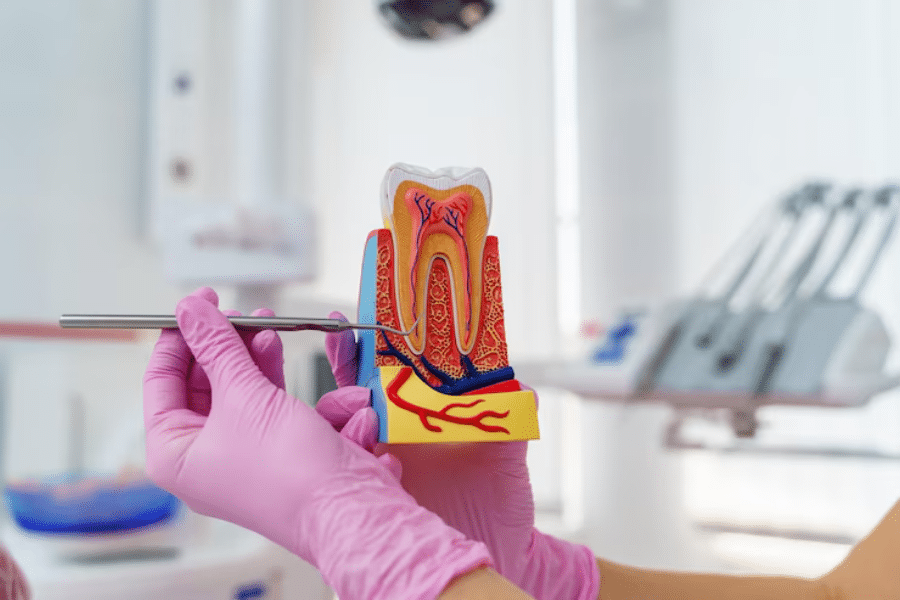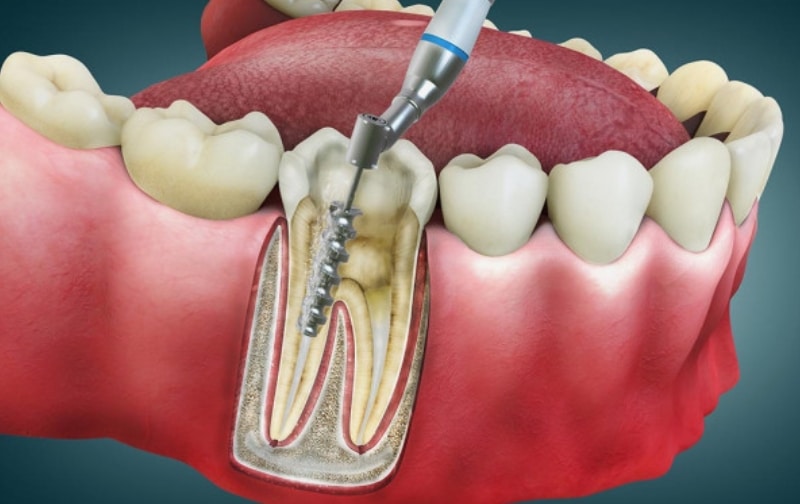
Are you experiencing persistent tooth pain or sensitivity? It could be a sign of a root canal infection. Don’t panic just yet! This blog post will guide you through everything you need to know about root canal infections – from their symptoms and causes to treatment options and prevention strategies.
No one enjoys thinking about dental procedures, but understanding the ins and outs of root canal infections can help ease your worries. So sit back, relax (but not too much!), and let’s dive into this informative journey together.
In this article, we’ll address common questions like Can an infection spread to the gums or other teeth? What exactly causes these pesky infections? And most importantly, how can they be treated effectively?
But don’t worry; it’s not all doom and gloom! We’ll also provide you with some helpful tips on preventing future root canal infections so that you can maintain optimal oral health.
So grab your favorite beverage (and maybe a comfy pillow) as we explore the fascinating world of root canal infections. Let’s get started!
What are Root Canal Infections?
When the innermost layer of a tooth, called the pulp, becomes infected, it causes a root canal infection. The pulp contains nerves and blood vessels that nourish the tooth, but it is susceptible to infection for many reasons.
Symptoms of a root canal infection include severe tooth pain, sensitivity to hot and cold temperatures, swelling around the affected area, bad breath, and tender gums.
A root canal infection can lead to more serious complications like an abscess or even spread to other teeth if left untreated.
A root canal infection is most often caused by decay that has reached the pulp of a tooth. However, trauma to the tooth, cracks or fractures in teeth, repeated dental procedures, or gum disease can also cause these infections.

What are the Symptoms of a Root Canal Infection?
When it comes to root canal infections, there are a few telltale signs that can indicate something is amiss. One common symptom is persistent pain in the affected tooth. This pain may be mild at first but can gradually worsen over time.
In addition to pain, you may also experience sensitivity to hot or cold temperatures. If you find that sipping on your morning coffee or enjoying an ice cream cone causes discomfort, it could be a sign of a root canal infection.
Another possible symptom is swelling and tenderness around the infected tooth. This swelling may extend beyond just the immediate area and can affect the surrounding gums as well.
You might also notice changes in the color of your tooth. A darkening or discoloration could indicate an infection deep within the tooth’s pulp.
It’s important to note that not all people will experience these symptoms, and some individuals may not have any noticeable signs at all. That’s why regular dental check-ups are crucial for detecting and treating root canal infections before they become severe.
Can an Infection Spread to the Gums or to Other Teeth?
It is possible for a root canal infection to spread beyond the affected tooth and affect your neighboring teeth and gums as well. By traveling through the root canal system, which contains nerves, blood vessels, and pulp tissue, the infection can reach other parts of your mouth.
During an infection of a root canal, bacteria multiply rapidly in the pulp chamber. If left untreated, these bacteria can penetrate deeper into the tooth roots and eventually reach the gums. If not treated promptly, this can cause gingivitis or periodontitis, an inflammation and swelling of the gums.
Further, if an infected tooth is located near healthy teeth, bacteria from the infected tooth may spread to those adjacent teeth as well, resulting in the development of new infections.
Regular dental checkups are crucial for early detection and intervention when needed in the event of a root canal infection.
What Causes Root Canal Infections?
What causes root canal infections? Understanding the underlying factors that contribute to these infections is crucial for preventing future problems.
One common cause of root canal infections is untreated tooth decay. When a cavity goes deep into the tooth, it can reach the pulp, which contains nerves and blood vessels. Bacteria from the decayed area can enter the pulp and cause an infection.
Another factor that can lead to root canal infections is dental trauma or injury. If a tooth gets cracked or fractured, bacteria can again find their way inside and infect the pulp.
Additionally, poor oral hygiene plays a significant role in causing root canal infections. Failing to brush and floss regularly allows harmful bacteria to accumulate on teeth surfaces, increasing the risk of infection.
Furthermore, previous dental procedures such as multiple fillings or crowns can weaken a tooth’s structure over time, making it more susceptible to infection.
Genetic predisposition may also influence one’s susceptibility to root canal infections. Some individuals naturally have thinner enamel or weaker immune systems, making them more prone to dental issues.
How are Root Canal Infections Treated?
Root canal infections can be quite painful and uncomfortable, but the good news is that they can be effectively treated. The first step in treating a root canal infection is to visit a qualified dentist who specializes in endodontics, such as a root canal in Pasadena specialist.
During the treatment process, the dentist will start by numbing the area around the affected tooth using local anesthesia. This ensures that you won’t feel any pain during the procedure. Once you’re numb and comfortable, your dentist will create a small opening in your tooth to access the infected pulp inside.
Next, they will carefully remove all of the infected tissue from within your tooth using specialized tools. This includes removing both the pulp and any bacteria or debris that may be present. After cleaning out all of the infected material, your dentist will thoroughly disinfect and sterilize the inside of your tooth to prevent any further infection.
In some cases, a temporary filling may be placed while awaiting a permanent restoration like a crown or dental bridge.
After completing these steps, it’s important to follow up with regular check-ups to ensure that everything heals properly and there are no further issues with your treated tooth.
Tips for Preventing Root Canal Infections
Maintaining good oral hygiene is crucial for preventing root canal infections. Here are some simple yet effective tips to help you keep your teeth and gums healthy:
1. Brush Twice a Day: Make it a habit to brush your teeth at least twice a day using fluoride toothpaste. This helps remove plaque and bacteria that can lead to infection.
2. Floss Daily: Don’t forget to floss between your teeth every day, as it helps remove debris and bacteria from areas that the toothbrush may not reach.
3. Rinse with Mouthwash: Using an antibacterial mouthwash can further reduce the number of bacteria in your mouth, helping prevent infection.
4. Limit Sugary Foods and Drinks: Consuming too much sugar can contribute to tooth decay, which may eventually lead to root canal infections. Opt for healthier alternatives whenever possible.
5. Visit Your Dentist Regularly: Regular dental check-ups allow dentists to detect any signs of infection or other dental issues early on, preventing them from worsening.
6. Wear Protective Gear During Sports: If you participate in contact sports or activities where there’s a risk of facial injury, wearing a mouthguard can help protect your teeth from trauma that could result in root canal infections.
By following these preventive measures, you can significantly reduce the chances of developing painful and costly root canal infections.
Root canal infections can be painful and potentially lead to serious oral health issues if left untreated. It is important to recognize the symptoms of a root canal infection, such as severe tooth pain, sensitivity to hot or cold temperatures, and swelling in the surrounding area.
If you suspect that you have a root canal infection, it is crucial to seek prompt treatment from a dentist in Pasadena. They have experienced dentists who specialize in endodontic procedures like root canals.
A dentist will remove the pulp from the tooth, clean out bacteria and debris, and then fill the remaining space with biocompatible material before sealing it off with a crown.
While there are no foolproof methods for preventing all cases of root canal infections, there are steps you can take to reduce your risk. Maintaining good oral hygiene practices, including regular brushing and flossing, can help minimize bacteria buildup that could lead to an infection. Additionally, scheduling routine dental check-ups allows your dentist in Pasadena to detect any potential problems early on and address them promptly.
Remember that prevention is key when it comes to maintaining optimal oral health. By taking care of your teeth and seeking professional dental care when needed, you can greatly reduce your chances of developing painful conditions like root canal infections.


